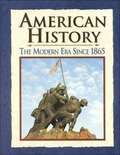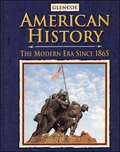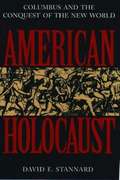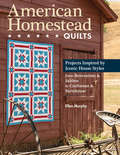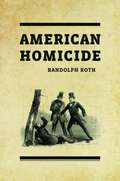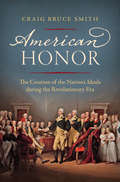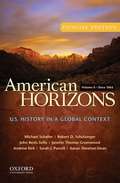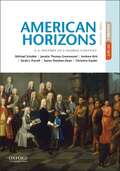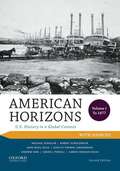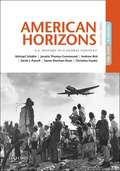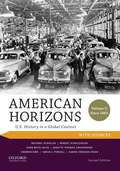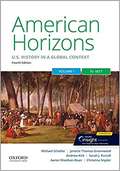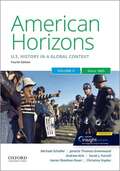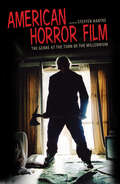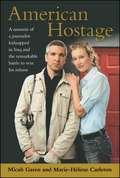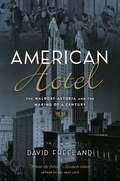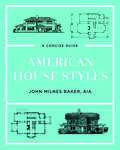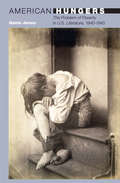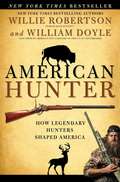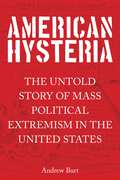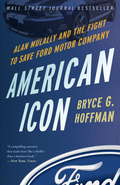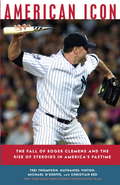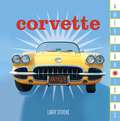- Table View
- List View
American History: The Modern Era Since 1865
by Donald A. RitchieImagine a United States without computers, telephones, or automobiles, where women and most minoritites cannot vote, a place where 8 to 10 people work on farms, and higher education is privilege reserved for the fortunate few.
American History: The Modern Era since 1865
by Donald A. RitchieThe book contains unit lessons on Creating A Nation Prehistory to 1815, Forging a Nation 1815-1877, New Horizons 1860-1900, Entering a New Century 1867-1920, Crusade and Disillusion 1911-1932, Times of Crisis 1932-1960, Redefining America 1954-Present plus additional features of Atlas, United States Databank, Presidents of the United States, Career Connections Handbook, etc.
American History: The Modern Era since 1865
by Donald A. RitchieImagine a United States without computers, telephones, or automobiles, where women and most minorities cannot vote, a place where 8 of 10 people work on farms, and higher education is a privilege reserved for the fortunate few.
American History: We the People
by Mara L. Pratt Reed R. SimonsenThis is the story of the birth of the nation, the signing of the U.S. Constitution, the War of 1812 and the struggles that followed. Volume Two is a photo-reproduction of an original history book used in 1890 to teach our children the grandeur of the America vision. These pages contain the stories of countless men, women and children who bravely built a new land into the great bastion of freedom we enjoy today. This book contains the history that schools leave out. It is unfortunate that many of the stories of patriotism are set aside today for current events and more recent historical interpretations. In the mad rush to offer a little piece of history from each American era, the truly inspirational events of our Founding Fathers are lost.
American Holocaust: The Conquest of the New World
by David E. StannardHow we destroyed more than one-hundred million of the earlier inhabitants of the New World.
American Homestead Quilts: Projects Inspired by Iconic House Styles from Brownstone & Saltbox to Craftsman & Farmhouse
by Ellen MurphyPair timeless quilt designs and classic American homes with this book featuring “lyrical commentary [and] clear how-tos” (Publishers Weekly).Designer Ellen Murphy has created unique quilts inspired by the colors and shapes of American houses. From colonial farmhouses to brownstones, these quilts will beautify any décor. This book includes patterns and complete instructions for nine traditional pieced quilts in a variety of sizes and color palettes, plus inspirational photos featuring iconic American homes. Classic-styled quilts are perfect for building your sewing skills: Begin with simple squares and work your way up to more challenging diamond patterns.
American Homicide
by Randolph RothIn American Homicide, Randolph Roth charts changes in the character and incidence of homicide in the U.S. from colonial times to the present. Roth argues that the United States is distinctive in its level of violence among unrelated adults—friends, acquaintances, and strangers. America was extraordinarily homicidal in the mid-seventeenth century, but it became relatively non-homicidal by the mid-eighteenth century, even in the slave South; and by the early nineteenth century, rates in the North and the mountain South were extremely low. But the homicide rate rose substantially among unrelated adults in the slave South after the American Revolution; and it skyrocketed across the United States from the late 1840s through the mid-1870s, while rates in most other Western nations held steady or fell. That surge—and all subsequent increases in the homicide rate—correlated closely with four distinct phenomena: political instability; a loss of government legitimacy; a loss of fellow-feeling among members of society caused by racial, religious, or political antagonism; and a loss of faith in the social hierarchy. Those four factors, Roth argues, best explain why homicide rates have gone up and down in the United States and in other Western nations over the past four centuries, and why the United States is today the most homicidal affluent nation.
American Honor: The Creation of the Nation's Ideals during the Revolutionary Era
by Craig Bruce SmithThe American Revolution was not only a revolution for liberty and freedom, it was also a revolution of ethics, reshaping what colonial Americans understood as "honor" and "virtue." As Craig Bruce Smith demonstrates, these concepts were crucial aspects of Revolutionary Americans' ideological break from Europe and shared by all ranks of society. Focusing his study primarily on prominent Americans who came of age before and during the Revolution—notably John Adams, Benjamin Franklin, Thomas Jefferson, and George Washington—Smith shows how a colonial ethical transformation caused and became inseparable from the American Revolution, creating an ethical ideology that still remains.By also interweaving individuals and groups that have historically been excluded from the discussion of honor—such as female thinkers, women patriots, slaves, and free African Americans—Smith makes a broad and significant argument about how the Revolutionary era witnessed a fundamental shift in ethical ideas. This thoughtful work sheds new light on a forgotten cause of the Revolution and on the ideological foundation of the United States.
American Horizons, Concise: U. S. History in a Global Context, Volume II: Since 1865
by Michael Schaller Janette Thomas Greenwood Aaron Sheehan-Dean Robert Schulzinger Andrew Kirk Sarah J. Purcell John BezIs-Selfa<p>American Horizons is the only U.S. History survey text that presents the traditional narrative in a global context. The seven-author team uses the frequent movement of people, goods, and ideas into, out of, and within America's borders as a framework. This unique approach provides a fully integrated global perspective that seamlessly contextualizes American events within the wider world. The authors, all acclaimed scholars in their specialties, use their individual strengths to provide students with a balanced and inclusive account of U.S. history. <p>Presented in two volumes for maximum flexibility, American Horizons illustrates the relevance of U.S. history to American students by centering on the matrix of issues that dominate their lives. These touchstone themes include population movements and growth, the evolving definition of citizenship, cultural change and continuity, people's relationship to and impact upon the environment, political and ideological contests and their consequences, and Americans' five centuries of engagement with regional, national, and global institutions, forces, and events. In addition, this beautifully designed, full-color book features hundreds of photos and images and more than one hundred maps.</p>
American Horizons: U. S. History In A Global Context, Volume I
by Michael Schaller Janette Thomas Greenwood Christina Snyder Aaron Sheehan-Dean Andrew Kirk Sarah J. PurcellAmerican Horizons, Third Edition, presents the traditional narrative of U.S. history in a global context. The authors use the frequent movement of people, goods, and ideas into, out of, and within America's borders as a framework. This unique approach provides a fully integrated global perspective that seamlessly contextualizes American events within the wider world. The authors, all acclaimed scholars in their specialties, use their individual strengths to provide students with a balanced and inclusive account of U.S. history. Presented in two volumes for maximum flexibility, American Horizons, Third Edition, illustrates the relevance of U.S. history to American students by centering on the matrix of issues that dominate their lives. These touchstone themes include population movements and growth, the evolving definition of citizenship, cultural change and continuity, people's relationship to and impact upon the environment, political and ideological contests and their consequences, and Americans' five centuries of engagement with regional, national, and global institutions, forces, and events. In addition, this beautifully designed, full-color book features hundreds of photos and images and more than 100 maps.
American Horizons: U. S. History in a Global Context (Volume 1 #1877)
by Michael Schaller Janette Thomas Greenwood Aaron Sheehan-Dean Robert Schulzinger Andrew Kirk Sarah J. Purcell John Bezis-SelfaAmerican Horizons, Second Edition, is the only U. S. History survey text that presents the traditional narrative in a global context. The authors use the frequent movement of people, goods, and ideas into, out of, and within America's borders as a framework. This unique approach provides afully integrated global perspective that seamlessly contextualizes American events within the wider world. The authors, all acclaimed scholars in their specialties, use their individual strengths to provide students with a balanced and inclusive account of U. S. history. Presented in two volumes for maximum flexibility, American Horizons, Second Edition, illustrates the relevance of U. S. history to American students by centering on the matrix of issues that dominate their lives. These touchstone themes include population movements and growth, the evolving definitionof citizenship, cultural change and continuity, people's relationship to and impact upon the environment, political and ideological contests and their consequences, and Americans' five centuries of engagement with regional, national, and global institutions, forces, and events. In addition, thisbeautifully designed, full-color book features hundreds of photos and images and more than 100 maps.
American Horizons: U.S. History In A Global Context, Volume II: Since 1865
by Michael Schaller Janette Thomas Greenwood Christina Snyder Aaron Sheehan-Dean Robert Schulzinger Andrew Kirk Sarah J. Purcell John Bezis-SelfaAmerican Horizons, Third Edition, presents the traditional narrative of U.S. history in a global context. The authors use the frequent movement of people, goods, and ideas into, out of, and within America's borders as a framework. This unique approach provides a fully integrated global perspective that seamlessly contextualizes American events within the wider world. The authors, all acclaimed scholars in their specialties, use their individual strengths to provide students with a balanced and inclusive account of U.S. history. Presented in two volumes for maximum flexibility, American Horizons, Third Edition, illustrates the relevance of U.S. history to American students by centering on the matrix of issues that dominate their lives. These touchstone themes include population movements and growth, the evolving definition of citizenship, cultural change and continuity, people's relationship to and impact upon the environment, political and ideological contests and their consequences, and Americans' five centuries of engagement with regional, national, and global institutions, forces, and events. In addition, this beautifully designed, full-color book features hundreds of photos and images and more than 100 maps.
American Horizons: U.S. History in a Global Context (Volume II) (Second Edition)
by Michael Schaller Janette Thomas Greenwood Aaron Sheehan-Dean Robert Schulzinger Andrew Kirk Sarah J. Purcell John Bezis-SelfaAmerican Horizons, Second Edition, is the only U. S. History survey text that presents the traditional narrative in a global context. The authors use the frequent movement of people, goods, and ideas into, out of, and within America's borders as a framework. This unique approach provides afully integrated global perspective that seamlessly contextualizes American events within the wider world. The authors, all acclaimed scholars in their specialties, use their individual strengths to provide students with a balanced and inclusive account of U. S. history. Presented in two volumes for maximum flexibility, American Horizons, Second Edition, illustrates the relevance of U. S. history to American students by centering on the matrix of issues that dominate their lives. These touchstone themes include population movements and growth, the evolving definitionof citizenship, cultural change and continuity, people's relationship to and impact upon the environment, political and ideological contests and their consequences, and Americans' five centuries of engagement with regional, national, and global institutions, forces, and events. In addition, thisbeautifully designed, full-color book features hundreds of photos and images and more than 100 maps.
American Horizons: US History In A Global Context, Volume One: To 1877
by Michael Schaller Janette Thomas Greenwood Christina Snyder Aaron Sheehan-Dean Andrew Kirk Sarah J. PurcellIn American Horizons: U.S. History in a Global Context, Fourth Edition, the authors use the frequent movement of people, goods, and ideas into, out of, and within America's borders as a framework. This unique approach provides a fully integrated global perspective that seamlessly contextualizes American events within the wider world. Presented in two volumes for maximum flexibility--and supplemented by two sourcebooks of primary documents--American Horizons illustrates the relevance of U.S. history to students by centering on the matrix of issues that dominate their lives.
American Horizons: Us History In A Global Context, Volume Two: Since 1865
by Michael Schaller Janette Thomas Greenwood Christina Snyder Aaron Sheehan-Dean Andrew Kirk Sarah J. PurcellIn American Horizons: U.S. History in a Global Context, Fourth Edition, the authors use the frequent movement of people, goods, and ideas into, out of, and within America's borders as a framework. This unique approach provides a fully integrated global perspective that seamlessly contextualizes American events within the wider world. Presented in two volumes for maximum flexibility--and supplemented by two sourcebooks of primary documents--American Horizons illustrates the relevance of U.S. history to students by centering on the matrix of issues that dominate their lives.
American Horror Film: The Genre at the Turn of the Millennium
by Steffen HantkeCreatively spent and politically irrelevant, the American horror film is a mere ghost of its former self—or so goes the old saw from fans and scholars alike. Taking on this undeserved reputation, the contributors to this collection provide a comprehensive look at a decade of cinematic production, covering a wide variety of material from the last ten years with a clear critical eye. Individual essays profile the work of up-and-coming director Alexandre Aja and reassess William Malone’s much-maligned Feardotcom in the light of the torture debate at the end of President George W. Bush’s administration. Other essays look at the economic, social, and formal aspects of the genre; the globalization of the US film industry; the alleged escalation of cinematic violence; and the massive commercial popularity of the remake. Some essays examine specific subgenres—from the teenage horror flick to the serial killer film and the spiritual horror film—as well as the continuing relevance of classic directors such as George A. Romero, David Cronenberg, John Landis, and Stuart Gordon. Essays deliberate on the marketing of nostalgia and its concomitant aesthetic and on the curiously schizophrenic perspective of fans who happen to be scholars as well. Taken together, the contributors to this collection make a compelling case that American horror cinema is as vital, creative, and thought-provoking as it ever was.
American Hostage: A Memoir of a Journalist Kidnapped in Iraq and the Remarkable Battle to Win His Release
by Micah Garen Marie-Helene CarletonA rare and powerful story of hope, love, survival,and the struggle to bring back alive a hostage in Iraq Micah Garen and Marie-Hélène Carleton were journalists and filmmakers working in Iraq on a documentary about the looting of the country's legendary archaeological sites, with their Iraqi translator Amir Doshi. In the late summer of 2004, they began to wrap up their work, and Marie-Hélène returned home while Micah remained for a final two weeks of filming. As Micah and Amir were filming in a Nasiriyah market, something went horribly wrong: Micah, who wore a bushy mustache and was dressed in Iraqi clothing, was unmasked as a foreigner and kidnapped by militants in southern Iraq. Home in New York, Marie-Hélène awoke to a gut-wrenching phone call from Micah's mother with word of his abduction. She promised Micah's mother the impossible--that together they would bring Micah back alive. American Hostage is the remarkable memoir of Micah Garen's harrowing abduction and survival in captivity, as well as the heroic and successful struggle of Marie-Hélène; Micah's sister, Eva; along with family and friends to win Micah's and Amir's release from their captors. The world watched and waited as Micah's drama unfolded, but the authors, now safely home and engaged to be married, detail the dramatic untold story. After learning of Micah's abduction, Marie-Hélène took a risky and unusual step: instead of relying on the authorities to rescue Micah, she used her recent experience in Iraq to construct a massive grassroots effort to reach out to Micah's captors and plead for his release. As fighting between Coalition forces and the Mahdi Army raged in Najaf, Micah and Amir became pawns in a terrible political game. The kidnappers released a video threatening to kill Micah unless the United States withdrew from Najaf within forty-eight hours. In response, Marie-Hélène's and Micah's families redoubled their efforts, eventually sending a representative to Nasiriyah to lobby for Micah. While Marie-Hélène worked on his release, Micah, imprisoned alongside Amir under armed guard deep in the marshes of southern Iraq, lived the nightmare of a hostagehaunted by the alternating impulses of hope and despair, his desire for survival and plans of escape. His experience reveals a great deal about the lives and minds of militants in southern Iraq. American Hostage is an engrossing and rare story of how hope, love, and communal effort can overcome war, distance, and cultural differences in Iraq.
American Hotel: The Waldorf-Astoria and the Making of a Century
by David FreelandCompleted in 1931, New York’s Waldorf-Astoria towers over Park Avenue as an international landmark and a masterpiece of Art Deco architecture. A symbol of elegance and luxury, the hotel has hosted countless movie stars, business tycoons, and world leaders over the past ninety years. American Hotel takes us behind the glittering image to reveal the full extent of the Waldorf’s contribution toward shaping twentieth-century life and culture. Historian David Freeland examines the Waldorf from the opening of its first location in 1893 through its rise to a place of influence on the local, national, and international stage. Along the way, he explores how the hotel’s mission to provide hospitality to a diverse range of guests was put to the test by events such as Prohibition, the anticommunist Red Scare, and civil rights struggles. Alongside famous guests like Frank Sinatra, Martin Luther King, Richard Nixon, and Eleanor Roosevelt, readers will meet the lesser-known men and women who made the Waldorf a leader in the hotel industry and a key setting for international events. American Hotel chronicles how institutions such as the Waldorf-Astoria played an essential role in New York’s growth as a world capital.
American House Styles (Second edition): A Concise Guide
by John Milnes Baker“An engaging historical account and an attractive, practical resource.” —Booklist Colonial, Neoclassical, Queen Anne, Craftsman—what distinguishes one architectural style from another? This unique book will allow readers to recognize the architectural features and style of virtually any house they encounter. Here, architect John Milnes Baker explains the historical, cultural, and technical influences that shaped each of these styles and many more. Organized in periods, from Early Colonial (1600–1715) to the Modern Movement (1920–60) and beyond, this tour of America’s varied residential architecture is rendered in elevation drawings that precisely illustrate the key characteristics of each style. Nearly 25 years since the original publication of American House Styles, this updated edition includes a new preface and house styles from the mid-1990s to the present—from the rise and fall of the McMansion to energy-efficient, regionally influenced homes. The illustrations, now in color, are more delightful than ever in a new, larger format. This a must-have volume for anyone interested in architecture or adding a bit of style to their home.
American Hungers: The Problem of Poverty in U.S. Literature, 1840-1945 (20/21 #9)
by Gavin JonesSocial anxiety about poverty surfaces with startling frequency in American literature. Yet, as Gavin Jones argues, poverty has been denied its due as a critical and ideological framework in its own right, despite recent interest in representations of the lower classes and the marginalized. These insights lay the groundwork for American Hungers, in which Jones uncovers a complex and controversial discourse on the poor that stretches from the antebellum era through the Depression. Reading writers such as Herman Melville, Theodore Dreiser, Edith Wharton, James Agee, and Richard Wright in their historical contexts, Jones explores why they succeeded where literary critics have fallen short. These authors acknowledged a poverty that was as aesthetically and culturally significant as it was socially and materially real. They confronted the ideological dilemmas of approaching poverty while giving language to the marginalized poor--the beggars, tramps, sharecroppers, and factory workers who form a persistent segment of American society. Far from peripheral, poverty emerges at the center of national debates about social justice, citizenship, and minority identity. And literature becomes a crucial tool to understand an economic and cultural condition that is at once urgent and elusive because it cuts across the categories of race, gender, and class by which we conventionally understand social difference. Combining social theory with literary analysis, American Hungers masterfully brings poverty into the mainstream critical idiom.
American Hunter
by William Doyle Willie RobertsonNew York Times bestselling author and star of A&E's Duck Dynasty, Willie Robertson, teams up with William Doyle, the bestselling co-author of American Gun, to share the history of America's most well known hunters.American Hunter is the first book ever to compile a chronological history of America's greatest hunters. Based on the powerful personalities of colorful men and women, this book begins with the Plains Indians and moves through legendary hunters like Daniel Boone, Davy Crockett, Kit Carson, Buffalo Bill, Teddy Roosevelt, Ernest Hemingway, Lyndon Johnson, and more. Also included are the histories of American fox, rabbit, deer, squirrel, duck, goose, and big-game hunting, as well as action biographies of classic hunting weapons. Author Willie Robertson, famed hunter of Duck Dynasty and Duck Commander, lends his voice to share this bodacious collection of true stories that you'll want to tell around the campfire after a long day's hunt. As Teddy Roosevelt put it, "The virility, clear-sighted common sense and resourcefulness of the American people is due to the fact that we have been a nation of hunters and frequenters of the forest, plains, and waters." It's about time we honor American hunters with a book that tells their incredible stories of skill, courage, survival, and downright bodaciousness. American Hunter is the perfect book for everyone who enjoys amazing tales of American history and for those who love hunting, sport shooting, and wide open spaces.
American Hysteria: The Untold Story of Mass Political Extremism in the United States
by Andrew BurtThis debut book from Andrew Burt details the pivotal moments in American political history when outliers moved to the center, capturing the national spotlight and turning fringe politics mainstream. American Hysteria puts readers at the center of the nation&’s most prominent periods of political extremism, from the Anti-Illuminati movement of the 1790s to McCarthyism in the 1950s to the Anti-Sharia movement of today. Both a deep dive into American history and a riveting narrative account, this is book is as much history lesson as it is drama.Burt argues that political hysteria arises in periods of deep uncertainty about American identity, and that when Americans lose their sense of who they are, they lash out against perceived threats with blacklists, scapegoating, conspiracies, cover-ups and more. By exploring the infamous and sometimes forgotten movements and characters of our nation&’s past, this fascinating book provides a unique view into America&’s history, its identity, and ultimately its future.
American Icon: Alan Mulally and the Fight to Save Ford Motor Company
by Bryce G. HoffmanTHE INSIDE STORY OF THE EPIC TURNAROUND OF FORD MOTOR COMPANY UNDER THE LEADERSHIP OF CEO ALAN MULALLY. At the end of 2008, Ford Motor Company was just months away from running out of cash. With the auto industry careening toward ruin, Congress offered all three Detroit automakers a bailout. General Motors and Chrysler grabbed the taxpayer lifeline, but Ford decided to save itself. Under the leadership of charismatic CEO Alan Mulally, Ford had already put together a bold plan to unify its divided global operations, transform its lackluster product lineup, and overcome a dysfunctional culture of infighting, backstabbing, and excuses. It was an extraordinary risk, but it was the only way the Ford family--America's last great industrial dynasty--could hold on to their company. Mulally and his team pulled off one of the greatest comebacks in business history. As the rest of Detroit collapsed, Ford went from the brink of bankruptcy to being the most profitable automaker in the world. American Icon is the compelling, behind-the-scenes account of that epic turnaround. On the verge of collapse, Ford went outside the auto industry and recruited Mulally--the man who had already saved Boeing from the deathblow of 9/11--to lead a sweeping restructuring of a company that had been unable to overcome decades of mismanagement and denial. Mulally applied the principles he developed at Boeing to streamline Ford's inefficient operations, force its fractious executives to work together as a team, and spark a product renaissance in Dearborn. He also convinced the United Auto Workers to join his fight for the soul of American manufacturing. Bryce Hoffman reveals the untold story of the covert meetings with UAW leaders that led to a game-changing contract, Bill Ford's battle to hold the Ford family together when many were ready to cash in their stock and write off the company, and the secret alliance with Toyota and Honda that helped prop up the American automotive supply base. In one of the great management narratives of our time, Hoffman puts the reader inside the boardroom as Mulally uses his celebrated Business Plan Review meetings to drive change and force Ford to deal with the painful realities of the American auto industry. Hoffman was granted unprecedented access to Ford's top executives and top-secret company documents. He spent countless hours with Alan Mulally, Bill Ford, the Ford family, former executives, labor leaders, and company directors. In the bestselling tradition of Too Big to Fail and The Big Short, American Icon is narrative nonfiction at its vivid and colorful best.
American Icon: The Fall of Roger Clemens and the Rise of Steroids in America's Pastime
by Teri Thompson Nathaniel Vinton Michael O'Keeffe Christian RedIt was an epic downfall. In twenty-four seasons pitcher Roger Clemens put together one of the greatest careers baseball has ever seen. Seven Cy Young Awards, two World Series championships, and 354 victories made him a lock for the Hall of Fame. But on December 13, 2007, the Mitchell Report laid waste to all that. Accusations that Clemens relied on steroids and human growth hormone provided and administered by his former trainer, Brian McNamee, have put Clemens in the crosshairs of a Justice Department investigation. Why did this happen? How did it happen? Who made the decisions that altered some lives and ruined others? How did a devastating culture of drugs, lies, sex, and cheating fester and grow throughout Major League Baseball's clubhouses? The answers are in these extraordinary pages. American Icon: The Fall of Roger Clemens and the Rise of Steroids in America's Pastime is about much more than the downfall of a superstar. While the fascinating portrait of Clemens is certainly at the center of the action, the book takes us outside the white lines and inside the lives and dealings of sports executives, trainers, congressmen, lawyers, drug dealers, groupies, a porn star, and even a murderer-- all of whom have ties to this saga. Four superb investigative journalists have spent years uncovering the truth, and at the heart of their investigation is a behind-the-scenes portrait of the maneuvering and strategies in the legal war between Clemens and his accuser, McNamee. This compelling story is the strongest examination yet of the rise of illegal drugs in America's favorite sport, the gym-rat culture in Texas that has played such an important role in spreading those drugs, and the way Congress has dealt with the entire issue. Andy Pettitte, Jose Canseco, Alex Rodriguez, and Chuck Knoblauch are just a few of the other players whose moving and sometimes disturbing stories are illuminated here as well. The New York Daily News Sports Investigative Team has written the definitive book on corruption and the steroids era in Major League Baseball. In doing so, they have managed to dig beneath the disillusion and disappointment to give us a stirring look at heroes who all too often live unheroic shadow lives.
American Icons: Corvette
by Larry StevensThe American Icons series celebrates the people, places, and objects that have informed American popular culture over the last 75 years. Illustrated throughout and replete with anecdotes, fun facts, and informative sidebars. American Icons: Corvette celebrates the vehicle that defined high-performance. Debuting in the early 1950s as a concept car, the Chevy Corvette became an instant symbol of automotive ingenuity and since then has introduced generations to a lifelong love of American sports cars. This book delves into the Corvette's history and explores its place within American pop culture.

